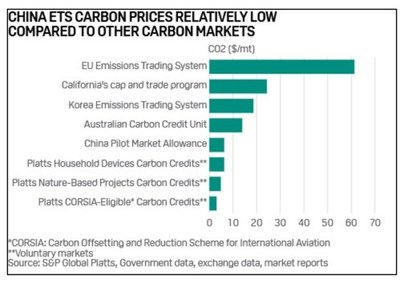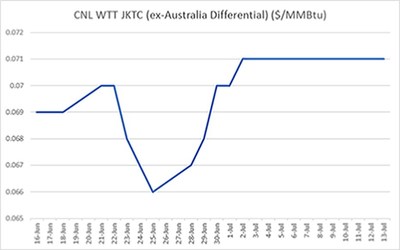S&P Global Platts Analytics: China's Carbon Trading Provides Additional Tool for Decarbonization
S&P Global Platts analyzes China's carbon emissions trading program, the world's largest, launched on July 16, 2021. This initiative aligns with China's commitment to meet its 2030 Paris Agreement targets. Although the initial impact on carbon pricing is deemed minimal, with only a 0.5% increase in LNG costs, it signals new investment opportunities in clean energy. Experts suggest that while coal will still account for nearly 30% of China's energy mix by 2050, this program may catalyze the development of carbon-neutral products, contributing to future decarbonization goals.
- Launch of the world's largest carbon trading program, signaling new clean investment opportunities.
- Potential for development of carbon-neutral products linked to the carbon trading scheme.
- Minimal initial impacts on carbon pricing, with coal expected to remain significant in China's energy mix (30% by 2050).
- Uncertainty regarding the carbon price's influence on investment decisions and coal reliance.
SINGAPORE, July 16, 2021 /PRNewswire/ -- S&P Global Platts ("Platts"), the leading independent provider of information, analytics, and benchmark prices for the commodities and energy markets today issued an analysis of China's Friday launch of its national carbon emissions trading program, which creates the world's largest carbon market. The 5 Year Plan (2021-2025) released this spring largely reinforced Paris Agreement nationally determined contribution (NDC) targets.
The most likely outlook from Platts Analytics' Global Integrated Energy Model shows China's 2030 goals being met, despite the strong rebound in coal and gas burn experienced this year. A much bigger question is around China's trajectory to achieve the announced 2060 net zero target.
- Platts Analytics' reference model still indicates coal accounting for nearly
30% of the nation's generating mix by 2050. - China's carbon market launch provides signals for new clean investment and an additional policy lever.
- Platts Analytics expects the program's initial impacts will be minimal, though it may pave the way for new carbon-neutral products development.
- Currently, China's ETS price is unlikely to affect the current energy mix, adding just
0.5% to the cost of offsetting the carbon associated with LNG cargoes.
Roman Kramarchuk, Head of Future Energy Analytics, S&P Global Platts:
"China will be launching the largest carbon trading program in the world, and will look to more cautiously gain experience with its operations before relying on it as the primary mechanism to drive decarbonization. The fact that clean energy policy targets through 2030 should largely be met, aligns with China's desire for more modest and stable carbon prices in the near to medium term - particularly given current price strength across commodities sectors. Carbon pricing can be among the more important tools China can employ to the daunting challenge of bending the curve after 2030."
Alan Hayes, Head of Energy Transition Pricing, S&P Global Platts: "Initial estimates of the carbon price for China's Emissions Trading Scheme align closely to some of the voluntary carbon market assessments published by Platts, but remain well below more mature exchange-traded carbon markets. The start-up of a carbon market in China could open the door to the development of a whole raft of new carbon neutral products. We have already seen the development of carbon neutral LNG assessments. There is no reason similar carbon neutral products can't be developed in China incorporating the price of carbon generated by this new trading scheme."
Platts has observed Chinese commodity buyers already start to seek out supplies that account for and offset carbon emissions – with CNOOC in particular leading the way. For imports into China of LNG, for example, this adds a premium of around 7 cents/MMBtu for emissions prior to import. The launch of China's domestic carbon market may galvanize regional trade in carbon accounted commodities as importers seek out supplies with the least environmental impact.
Any discussion of China's plan is not complete without a look at the realities of the nation's coal use.
China is the world's largest consumer of coal, accounting for more than two-thirds of global coal consumption, with its consumption moving strongly higher this year, pulled by strengthening electricity demand, on the back of a strong economic rebound. In spite of record high renewables additions in 2020, China thermal needs continue to grow and with this, coal as well. China has also the largest coal fleet globally, with over 1,000 GW operational units. A large number of units have been commissioned recently, and more than
Bruno Brunetti, Head of Low-Carbon Electricity Analytics, S&P Global Platts: "While China is already a global leader in renewables investment, it remains to be seen to what degree the carbon price will drive investment decisions and retirements of existing operational units, especially as China continues to rely on coal to meet growing power demand."
Visit Platts Live for more on carbon-neutral LNG and energy transition updates.
Media Contacts:
Americas: Kathleen Tanzy + 1 917-331-4607, Kathleen.tanzy@spglobal.com
About S&P Global Platts
At S&P Global Platts, we provide the insights; you make better informed trading and business decisions with confidence. We're the leading independent provider of information and benchmark prices for the commodities and energy markets. Customers in over 150 countries look to our expertise in news, pricing and analytics to deliver greater transparency and efficiency to markets. S&P Global Platts coverage includes oil, gas, LNG, power, petrochemicals, metals, agriculture and shipping.
S&P Global Platts is a division of S&P Global (NYSE: SPGI), which provides essential intelligence for individuals, companies and governments to make decisions with confidence. For more information, visit www.platts.com.
![]() View original content to download multimedia:https://www.prnewswire.com/news-releases/sp-global-platts-analytics-chinas-carbon-trading-provides-additional-tool-for-decarbonization-301335387.html
View original content to download multimedia:https://www.prnewswire.com/news-releases/sp-global-platts-analytics-chinas-carbon-trading-provides-additional-tool-for-decarbonization-301335387.html
SOURCE S&P Global Platts










